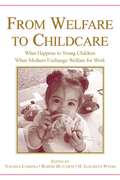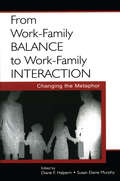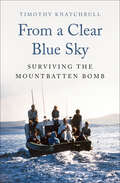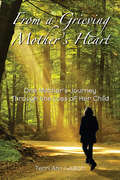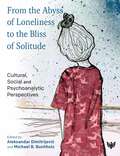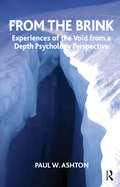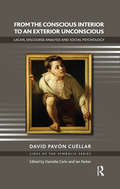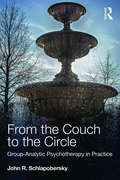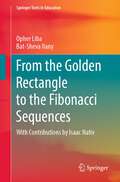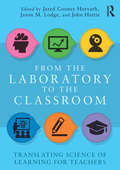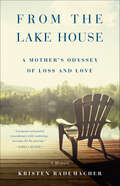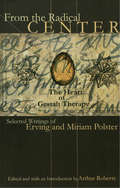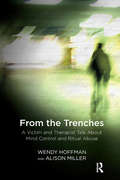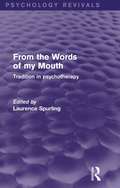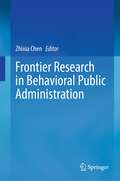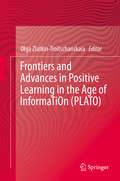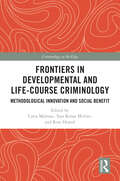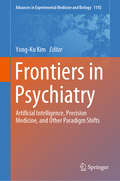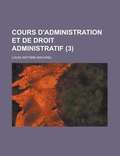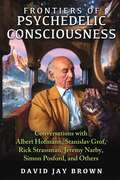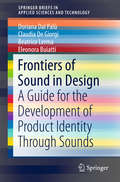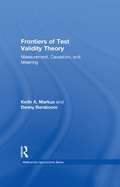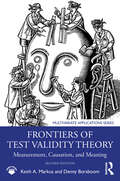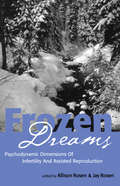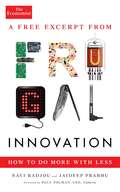- Table View
- List View
From Welfare to Childcare: What Happens to Young Children When Mothers Exchange Welfare for Work?
by H. Elizabeth Peters Natasha J. Cabrera Robert HutchensAlthough federal and state support for childcare has increased dramatically in response to welfare work requirements, low-income families are still facing difficulties balancing work and family obligations. There is wide variation across states in the strictness of welfare work requirements and in the generosity of childcare support. In addition, the level of co-payments required and the flexibility to use subsidies for informal modes of childcare differ across states, leading families to make different childcare and employment choices. The purpose of From Welfare to Childcare is first to describe what changes occurred in childcare following the 1996 welfare reform legislation, and then to analyze how federal welfare and subsidy policies influence the availability, accessibility, and quality of childcare arrangements for single mothers with young children. National in scope, it focuses on how the reforms influence the way that children are cared for when their mothers leave welfare and enter the workforce. This book is suitable for national, state, and local policymakers, non-profit organizations that study and attempt to influence public policy, and scholars interested in family and social policy issues. It can be used as a text in graduate level courses on welfare, poverty, and children and public policy.
From Work-Family Balance to Work-Family Interaction: Changing the Metaphor
by Diane F. Halpern Susan Elaine MurphyThere are many lessons to be learned about work-family interaction. It is clear that some people have learned how to combine work and family in ways that are mutually supporting--at least much of the time--and some employers have created work environments and policies that make positive interdependence of these two spheres more likely to occur. This book discusses measures of work-family, conflict, policies designed to reduce conflict, comparisons with other industrialized nations, and reasons why family-friendly work-policies have not been adopted with enthusiasm. The purpose is to consider a broad range of topics that pertain to work and family with the goal of helping employers and working families understand the work-life options that are available so they can make choices that offer returns-on-investments to employers, families, and society at large that are consistent with personal and societal values.This book brings together a superb panel of experts from different disciplines to look at work and family issues and the way they interact. Part I is an overview--with a brief discussion by a psychologist, economist, and a political scientist--each of whom provide their own interpretation of how their discipline views this hybrid field. Part II considers the business case of the question of why employers should invest in family-friendly work policies, followed by a section on the employer response to work family interactions. Families are the focus of the Part IV, followed by a look at children--many of whom are at the heart of work and family interaction.
From a Clear Blue Sky: Surviving the Mountbatten Bomb
by Timothy KnatchbullThe prize-winning, &“exceptionally moving&” memoir of a family boat trip, an IRA bombing, and a teenager&’s loss of his twin brother (The Telegraph).Christopher Ewart-Biggs Literary Award Winner and PEN/JR Ackerley Prize Nominee On an August weekend in 1979, fourteen-year-old Timothy Knatchbull joined his family on a boat trip off the shore of Mullaghmore in County Sligo, Ireland. By noon, an Irish Republican Army bomb had destroyed the boat, leaving four dead. The author survived, but his grandparents, family friend, and twin brother did not. Lord Mountbatten, his grandfather, was the target, and became one of the IRA&’s most high-profile assassinations. Knatchbull and his parents were too badly injured to attend the funerals of those killed, which only intensified their profound sense of loss. Telling this story decades later, Knatchbull not only revisits these terrible events but also writes an intensely personal account of human triumph over tragedy—a story of recovery not just from physical wounds but deep emotional trauma.From a Clear Blue Sky takes place in Ireland at the height of the Troubles and gives compelling insight into that period of Irish history. But more importantly, it brings home that while calamity can strike at any moment, the human spirit is able to forgive, to heal, and to move on. &“A minute by minute story of what happened that day, and what happened afterwards.&” —Daily Mail &“This is an extremely moving book. Beyond providing a phenomenally detailed evocation of his own family&’s trauma, Knatchbull has lots of wise things to say about how we survive horrors—of all kinds—in our lives.&” — Zoë Heller, author of the Booker Prize finalist Notes on a Scandal &“A very poignant, clearsighted, heartbreaking but ultimately positive account.&” —Hugh Bonneville, The New York Times
From a Grieving Mother's Heart
by Terri Ann LeidichWhen Terri Ann Leidich's twenty-year-old son was suddenly killed in a vehicle accident, she was thrown into the roller coaster agony of grief. Adapted from the journal she kept through the experience of her horrendous loss, this book is a roadmap for parents who have lost children, as well as for those who are on the sidelines, watching the agony of someone they care about and not knowing what to do or how to help. Terri Ann's ability to put emotions and experiences into words that everyone can understand and relate to can shine as a beacon of hope and understanding during a time of excruciating pain.
From the Abyss of Loneliness to the Bliss of Solitude: Cultural, Social and Psychoanalytic Perspectives
by Aleksandar Dimitrijević and Michael B. BuchholzSocial isolation and loneliness are increasingly being recognised as a priority public health problem and policy issue worldwide, with the effect on mortality comparable to risk-factors such as smoking, obesity, and physical inactivity. From the Abyss of Loneliness to the Bliss of Solitude sheds much-needed light on a multifaceted global phenomenon of loneliness, and investigates it, together with its counterpart solitude, from an exciting breadth of perspectives: detailed studies of psychoanalytic approaches to loneliness, developmental psychology, philosophy, culture, arts, music, literature, and neuroscience. The subjects covered also range widely, including the history and origins of loneliness, its effects on children, the creative process, health, lone wolf terrorism, and shame. This is a timely and important contribution to a growing problem - greatly exacerbated by the Covid-19 pandemic - that has serious effects on both life quality and expectancy. The book features contributions from a diverse host of leading international experts: Dominic Angeloch, Patrizia Arfelli, Charles Ashbach, Manfred E. Beutel, Elmar Brahler, Jagna Brudzinska, Michael B. Buchholz, Lesley Caldwell, Karin Dannecker, Aleksandar Dimitrejevic, Mareike Ernst, Jay Frankel, Gail A. Hornstein, Colum Kenny, Eva M. Klein, Helga de la Motte-Haber, Gamze Ozcurumez Bilgili, Inge Seiffge-Krenke, and Peter Shabad. The contributors address the developmental and communicative causes of loneliness, its neurophysiological correlates and artistic representations, and how loneliness differs to solitude, which some consider necessary for creativity. They also provide insights into how we can help those suffering from loneliness, as classical psychoanalytic papers are revisited, contemporary therapeutic perspectives presented, and detailed case presentations offered. From the Abyss of Loneliness to the Bliss of Solitude is essential reading for mental health professionals and those searching for a better understanding of what it means to be lonely and how the lonely can better voice their loneliness and step out of it.
From the Brink: Experiences of the Void from a Depth Psychology Perspective
by Paul W. AshtonA commonly encountered experience of both analyst and analysand is that of the void. It is spoken about at different stages of therapy and refers to experiences that have different origins. Sometimes the experience of the void is around a relatively limited aspect of the psyche but at other times the void seems much more global and threatens to engulf the entire personality; the whole individual psyche then seems threatened by the possibility of dissolution into nothingness.
From the Conscious Interior to an Exterior Unconscious: Lacan, Discourse Analysis and Social Psychology (The\lines Of The Symbolic Ser.)
by David Pavon CuellarThis striking Lacanian contribution to discourse analysis is also a critique of contemporary psychological abstraction, as well as a reassessment of the radical opposition between psychology and psychoanalysis. This original introduction to Lacan’s work bridges the gap between discourseanalytical debates in social psychology and the social-theoretical extensions of discourse theory. David Pavón Cuéllar provides a precise definition and a detailed explanation of key Lacanian concepts, and illustrates how they may be put to work on a concrete discourse, in this case a fragment of an interview obtained by the author from the Mexican underground Popular Revolutionary Forces (EPR). Throughout the book, Lacanian concepts are compared to their counterparts in psychology. Such a comparison reveals insuperable incompatibilities between the two series of concepts. The author shows that Lacan’s psychoanalytical terminology can neither be translated nor assimilated to the terms of current psychology. Among the notions in actual or potential competition with Lacanian concepts, the book deals with those proposed by semiology, Marxism, phenomenology, constructionism, deconstruction, and hermeneutics. Taking a stand on those theoretical positions, each chapter includes detailed discussion of the contribution of classical approaches to language; including Barthes, Bakhtin, Althusser, Politzer, Wittgenstein, Berger and Luckmann, Derrida, and Ricoeur. There is sustained reference in the body of the text to the arguments of Lacan and Lacanians, of Miller, Milner, Soler, and Žižek. At the same time, in the extensive notes accompanying the text, there is a systematic reappraisal and reinterpretation of debates and pieces of research work in social psychology, especially in a discursive and critical domain that has incorporated elements of psychoanalytic theory.
From the Couch to the Circle: Group-Analytic Psychotherapy in Practice
by John SchlapoberskyRecipient of the 2017 Anne Alonso Award for Excellence in Psychodynamic Group Therapy, conferred by the Group Foundation for Advancing Mental Health, part of the American Group Psychotherapy Association. From the Couch to the Circle: Group-Analytic Psychotherapy in Practice is a handbook of group therapy and a guide to the group-analytic model - the prevailing form of group therapy in Europe. The book draws on both John Schlapobersky’s engagement as a practitioner and the words and experience of people in groups as they face psychotherapy’s key challenges - understanding and change. This book provides a manual of practice for therapists’ use that includes detailed descriptions of groups at work; accounts of therapists’ own experience and the issues they face in themselves and in their groups. The book is devoted to the Group-Analytic model but the other principally psychodynamic models of group therapy - the Tavistock, Interpersonal, Psychodynamic, Modern Analytic and Structural/Systemic models - are brought into a comparative discussion and drawn upon to create an integrated and coherent approach. The book is divided into three sections: Foundations – aimed at practitioners using groups of any kind and working at every level, including those providing supportive psychotherapy and providing groups for psychosis, trauma, the elderly, people at risk, the elderly and children; The Group-Analytic Model – defines the group-analytic model at a basic and advanced level; The Dynamics of Change – aimed at group analysts, psychotherapists and psychologists providing short-term psychotherapy and long-term group analysis The book is illustrated with clinical vignettes including incisive, instructive commentaries to explain the concepts in use. It is intended for those seeking psychotherapy, whether to resolve personal problems or to find new sources of meaning in their lives. It is also intended for policy-makers in mental health, students of different models of psychotherapy and the psychosocial field. The comparative discussion running through the text about methods and models of practice will likely be of interest to the wider mental health and psychotherapy fields. The author draws together the inherited wisdom of group analysis since Foulkes’ time and makes his own lasting contribution. From the Couch to the Circle will be an invaluable, accessible resource for psychotherapists, psychoanalysts, psychologists, family therapists, academics, psychologists, mental health practitioners, academics and teachers in psychotherapy.
From the Golden Rectangle to the Fibonacci Sequences (Springer Texts in Education)
by Bat-Sheva Ilany Opher LibaThe book takes us on a fascinating journey through one of the most beautiful and fascinating topics of mathematics. It presents a wealth of information about the golden ratio and the Fibonacci sequence. The book introduces the reader to novel perspectives to classic mathematical concepts and problems. The book’s structure engages with the reader actively, leading to more profound understanding, satisfaction and deep insights in learning mathematics. The book strengthens and expands the readers' mathematical knowledge, allowing them a glimpse of several advanced academic concepts. It demonstrates and instils the essence of mathematical research, along the lines of George Polya: observation, conjecture, proof, implementation, generalization and raising new questions.
From the Laboratory to the Classroom: Translating Science of Learning for Teachers
by John Hattie Jared Cooney Horvath Jason M. LodgeOver recent years the field of Science of Learning has increased dramatically. Unfortunately, despite claims that this work will greatly impact education, very little research makes it into teacher practice. Although the reasons for this are varied, a primary concern is the lack of a proper translation framework. From the Laboratory to the Classroom aims to consolidate information from many different research disciplines and correlate learning principles with known classroom practices in order to establish explanatory foundations for successful strategies that can be implemented into the classroom. It combines theoretical research with the diverse and dynamic classroom environment to deliver original, effective and specific teaching and learning strategies and address questions concerning what possible mechanisms are at play as people learn. Divided into five sections, chapters cover: A Framework for Organizing and Translating Science of Learning Research Motivation and Attention as Foundations for Student Learning Memory and Metamemory Considerations in the Instruction of Human Beings Science of Learning in Digital Learning Environments Educational Approaches for Students Experiencing Learning Difficulties and Developmental Characteristics of Gifted Children Brain, Behaviour and Classroom Practice Forging Research/Practice Relationships via Laboratory Schools This fascinating text gathers an international team of expert scientists, teachers, and administrators to present a coherent framework for the vital translation of laboratory research for educational practice. Applying the Science of Learning framework to a number of different educational domains, it will be an essential guide for any student or researcher in education, educational psychology, neuropsychology, educational technology and the emergent field of neuroeducation.
From the Lake House: A Mother's Odyssey of Loss and Love
by Kristen RademacherDizzy with grief after a shattering breakup, Kristen did what any sensible thirty-nine-year-old woman would do: she fled, abandoning her well-ordered life in metropolitan Boston and impulsively relocating to a college town in North Carolina to start anew with a freshly divorced southerner. Dismissing the neon signs that flashed Rebound Relationship, Kristen was charmed by the host of contrasts with her new beau. He loved hunting and country music, she loved yoga and NPR; he worried about nothing, she worried about everything. The luster of her new romance and small-town lifestyle soon—and predictably—faded, but by then a pregnancy test stick had lit up. As Kristen’s belly grew, so did her concern about the bond with her partner—and so did a fierce love for her unborn child. Ready or not, she was about to become a mother. And then, tragedy struck. Poignant and insightful, From the Lake House explores the echoes of rash decisions and ill-fated relationships, the barren and disorienting days an aching mother faces without her baby, and the mysterious healing that can take root while rebuilding a life gutted from loss.
From the Radical Center: The Heart of Gestalt Therapy
by Erving Polster Miriam PolsterThis remarkable collection traces central themes in the work of Erving and Miriam Polster, two of the best-known and best loved Gestalt therapists in the world. The writings herein span 4 decades in the history of psychotherapy, bringing together practical, theoretical and aesthetic dimensions of the Polsters' work in a single book. Ranging across diverse subjects and distinct historical periods, the work collected in this volume will educate, provoke, inspire and nourish Gestalt therapists for years to come.
From the Trenches: A Victim and Therapist Talk about Mind Control and Ritual Abuse
by Wendy HoffmanThis book is a shaking read, its controversial political statement putting forward the demand that readers accept the existence of conscious splitting of personality through treachery, deception, betrayal, torture, and violence. Beginning with the introductory poem, the book is an outcry about the significance of personal freedom as well as a blazing plea for commitment to making these abuses known and helping victims achieve safety and healing. The two authors present victims' horrendous experiences in a rational, factual, and professional way, building a foundational knowledge regarding what mind control is, how it uses deceit and lies, and how through betrayal and attachment trauma the basis is laid for lifelong exploitation. The authors present the terrifying and horrible situations that children are exposed to as they are coerced into actions that go against their own beliefs and true natures. The cooperation of the two authors, client and therapist, based on mutual respect, serves as a model for every change process: solidarity, freedom, and equality
From the Words of my Mouth: Tradition in Psychotherapy (Psychology Revivals)
by Laurence SpurlingAs a psychotherapist, in whose name do I speak? How can I come to speak in my own name? What does ‘tradition’ mean in psychotherapy? Originally published in 1993, the contributors to this book – all practising psychotherapists and teachers – explore these questions and investigate how theories and practices are passed on from one generation to the next. Their responses range over questions of training and indoctrination, the idea of tradition in the thought of Freud, Jung and Winnicott, and the implications of these questions for the practice of psychotherapy. It will be of special interest to psychotherapists and counsellors, as well as students and teachers of therapy. With its emphasis on how psychotherapy might gain by seeing its connections to other traditions, such as literature, philosophy and the creative arts, the book will also appeal to a wider readership.
Frontier Research in Behavioral Public Administration
by Zhixia ChenThis book mainly summarizes and analyzes the advanced research progress in the field of behavioral public administration, and also looks forward to the future of related academic research. It helps readers to quickly grasp the frontiers and latest developments in the field of behavioral public administration. It is benefit for readers to learn the hot topics, issues, and research methods, improving their research ability. It not only includes the frontier progress in western culture but also includes the researches in China.
Frontiers and Advances in Positive Learning in the Age of InformaTiOn (PLATO)
by Olga Zlatkin-TroitschanskaiaResearch on students’ media use outside of education is just slowly taking off. Influences of information and communication technologies (ICT) on human information processing are widely assumed and particularly effects of dis- and misinformation are a current threat to democracies. Today, higher education competes with a very diverse (online) media landscape and domain-specific content from sources of varying quality, ranging from high-quality videographed lectures by top-level university lecturers, popular-scientific video talks, collaborative wikis, anonymous forum comments or blog posts to YouTube remixes of discipline factoids and unverified twitter feeds. Self-organizing learners need more knowledge, skills, and awareness on how to critically evaluate quality and select trustworthy sources, how to process information, and what cognitive, affective, attitudinal, behavioral, and neurological effects it can have on them in the long term. The PLATO program takes on the ambitious goal of uniting strands of research from various disciplines to address these questions through fundamental analyses of human information processing when learning with the Internet. This innovative interdisciplinary approach includes elements of ICT innovations and risks, learning analytics and large-scale computational modelling aimed to provide us with a better understanding of how to effectively and autonomously acquire reliable knowledge in the Information Age, how to design ICTs, and shape social and human-machine interactions for successful learning. This volume will be of interest to researchers in the fields of educational sciences, educational measurement and applied branches of the involved disciplines, including linguistics, mathematics, media studies, sociology of knowledge, philosophy of mind, business, ethics, and educational technology.
Frontiers in Developmental and Life-Course Criminology: Methodological Innovation and Social Benefit (Criminology at the Edge)
by Catia Malvaso, Tara Renae McGee, and Ross HomelFrontiers in Developmental and Life-Course Criminology advances the field of developmental and life-course criminology (DLC) by highlighting some recent methodological innovations, and exploring the ways in which DLC criminologists are helping to bridge the gap between science and service by their engagement with policymakers and government and non-government agencies. The book is united by three related themes: the use of new data sources including government administrative data systems, the development of intervention and prevention strategies grounded in DLC research, and resilience, prosocial behaviour, and strengths-based approaches. This book opens up new possibilities for the future of DLC research, orienting the DLC field as one that prioritises the achievement of better outcomes for individuals and society.
Frontiers in Psychiatry: Artificial Intelligence, Precision Medicine, and Other Paradigm Shifts (Advances in Experimental Medicine and Biology #1192)
by Yong-Ku KimThis book reviews key recent advances and new frontiers within psychiatric research and clinical practice. These advances either represent or are enabling paradigm shifts in the discipline and are influencing how we observe, derive and test hypotheses, and intervene. Progress in information technology is allowing the collection of scattered, fragmented data and the discovery of hidden meanings from stored data, and the impacts on psychiatry are fully explored. Detailed attention is also paid to the applications of artificial intelligence, machine learning, and data science technology in psychiatry and to their role in the development of new hypotheses, which in turn promise to lead to new discoveries and treatments. Emerging research methods for precision medicine are discussed, as are a variety of novel theoretical frameworks for research, such as theoretical psychiatry, the developmental approach to the definition of psychopathology, and the theory of constructed emotion. The concluding section considers novel interventions and treatment avenues, including psychobiotics, the use of neuromodulation to augment cognitive control of emotion, and the role of the telomere-telomerase system in psychopharmacological interventions.
Frontiers of Engineering
by National Academy of EngineeringCe livre historique peut contenir de nombreuses coquilles et du texte manquant. Les acheteurs peuvent generalement telecharger une copie gratuite scannee du livre original (sans les coquilles) aupres de lediteur. Non reference. Non illustre. 1856 edition. Extrait: . . . separe, une quantite de tetes de betail proportionnee a letendue de lexploitation, et suivant les dispositions des regles que je vous ai ci-dessus tracees. (Art. 15. ) IV. Quelques precautions ont ete prises enfin par la loi, pour proteger les cultures et les recoltes contre les abus journaliers du parcours et de la vaine pature. 1 Dans aucun cas, et dans aucun temps, ces droits ne peuvent sexercer sur les prairies artificielles, et ne peuvent avoir lieu sur aucune terre ensemencee ou couverte de quelques productions que ce soit, quapres la recolte. (. , art. 9. ) 2 Partout ou les prairies naturelles sont sujettes au parcours ou a la vaine pature, ils nont lieu que dans le temps autorise par les lois et coutumes, et jamais tant que la premiere herbe nest pas recoltee. (Ib. , art. 10. ) 3 Enfin, dans les lieux de parcours ou de vaine pature, comme dans ceux ou ces usages ne sont pas etablis, les patres et les bergers ne peuvent mener les troupeaux daucune espece dans les champs moissonnes et ouverts, que deux jours apres la recolte entiere, sous peine dune amende de la valeur dune journee de travail: lamende est double si les bestiaux ont penetre dans un enclos rural. (Art. 22. ) Cette suspension de lintroduction du betail dans les champs cultives a surtout ete etablie dans linteret du glanage et des malheureux pour lesquels il est une precieuse ressource. V. 11 fallait enfin coordonner les regles du parcours et de la vaine pature avec. . .
Frontiers of Psychedelic Consciousness: Conversations with Albert Hofmann, Stanislav Grof, Rick Strassman, Jeremy Narby, Simon Posford, and Others
by David Jay BrownIn-depth and well-researched interviews with the leading minds in psychedelic science and culture • A curated collection of interviews with 15 accomplished scientists, artists, and thinkers, including Albert Hofmann, Stanislav Grof, Rick Strassman, and Charles Tart • Explores their profound reflections on the intersections between psychedelics and a wide range of topics, including psychology, creativity, music, the near-death experience, DNA, and the future of psychedelic drug medical research After many dark years of zealous repression, there are now more than a dozen government-approved clinical studies with psychedelics taking place around the globe. But what does the future hold for psychedelic research and the expansion of consciousness? In this curated collection of interviews with pioneers in psychedelic thought, David Jay Brown explores the future of mind-altering drugs, hallucinogenic plants, and the evolution of human consciousness. The accomplished scientists, artists, and thinkers interviewed in the book include LSD discoverer Albert Hofmann, psychologist Stanislav Grof, DMT researcher Rick Strassman, anthropologist Jeremy Narby, MAPS founder Rick Doblin, ethnobotanist Dennis McKenna, psychologist Charles Tart, and musician Simon Posford from Shpongle, as well as many others. Demonstrating deep knowledge of his interviewees’ work, Brown elicits profound reflections from them as well as their considered opinions on the future of psychedelic drug medical research, God and the afterlife, LSD and mysticism, DMT research and non-human entity contact, problem-solving and psychedelics, ayahuasca and DNA, psilocybin and the religious experience, MDMA and PTSD, releasing the fear of death, the tryptamine dimension, the therapeutic potential of salvia, and the intersections between psychedelics and creativity, ecology, paranormal phenomena, and alternate realities. In each interview we discover how these influential minds were inspired by their use of entheogens. We see how psychedelics have the potential to help us survive as a species, not only by their therapeutic benefits but also by revealing our sacred connection to the biosphere and by prompting people to begin on the path of spiritual evolution.
Frontiers of Sound in Design: A Guide For The Development Of Product Identity Through Sounds (SpringerBriefs in Applied Sciences and Technology)
by Doriana Dal Palù Claudia De Giorgi Beatrice Lerma Eleonora BuiattiThis book serves as a guide to developing and designing the right sound to enhance a product’s identity, its use, its affordance and its acceptance by consumers. It is of interest to designers, researchers, R&D departments, marketing experts and industries involved in the exploration of the new frontiers now offered by sound. We are all immersed in an intangible world of sounds; however, the fact that only an infinitesimal part of the sound to which we are exposed has been wittingly created is often ignored. An interdisciplinary and trans-disciplinary approach encompassing design methods and design engineering, psychology and cognitive ergonomics, acoustics and psychoacoustics contributes to the improvement of product sound development. Providing readers with an overview of design methods in which sound becomes a new requirement, the book investigates the role of sound from the consumer viewpoint, presents several tools and practical examples of sensory design tools and projects, and lastly, introduces a new tool and method developed expressly to support the design of product sound.
Frontiers of Test Validity Theory: Measurement, Causation, and Meaning (Multivariate Applications Series)
by Keith A. Markus Denny BorsboomThis book examines test validity in the behavioral, social, and educational sciences by exploring three fundamental problems: measurement, causation and meaning. Psychometric and philosophical perspectives receive attention along with unresolved issues. The authors explore how measurement is conceived from both the classical and modern perspectives. The importance of understanding the underlying concepts as well as the practical challenges of test construction and use receive emphasis throughout. The book summarizes the current state of the test validity theory field. Necessary background on test theory and statistics is presented as a conceptual overview where needed. Each chapter begins with an overview of key material reviewed in previous chapters, concludes with a list of suggested readings, and features boxes with examples that connect theory to practice. These examples reflect actual situations that occurred in psychology, education, and other disciplines in the US and around the globe, bringing theory to life. Critical thinking questions related to the boxed material engage and challenge readers. A few examples include: What is the difference between intelligence and IQ? Can people disagree on issues of value but agree on issues of test validity? Is it possible to ask the same question in two different languages? The first part of the book contrasts theories of measurement as applied to the validity of behavioral science measures.The next part considers causal theories of measurement in relation to alternatives such as behavior domain sampling, and then unpacks the causal approach in terms of alternative theories of causation.The final section explores the meaning and interpretation of test scores as it applies to test validity. Each set of chapters opens with a review of the key theories and literature and concludes with a review of related open questions in test validity theory. Researchers, practitioners and policy makers interested in test validity or developing tests appreciate the book's cutting edge review of test validity. The book also serves as a supplement in graduate or advanced undergraduate courses on test validity, psychometrics, testing or measurement taught in psychology, education, sociology, social work, political science, business, criminal justice and other fields. The book does not assume a background in measurement.
Frontiers of Test Validity Theory: Measurement, Causation, and Meaning (Multivariate Applications Series)
by Keith A. Markus Denny BorsboomNow in its second edition, this important book examines test validity in the behavioral, social, and educational sciences by exploring three fundamental problems: measurement, causation, and meaning. Psychometric and philosophical perspectives and unresolved issues receive attention, as the authors explore how measurement is conceived from both the classical and modern perspectives.Split into three accessible sections, the first contrasts theories of measurement as applied to the validity of behavioral science measures, and the second considers causal theories of measurement as well as alternative theories of causation. The final section explores the meaning and interpretation of test scores as they apply to test validity, offering a conceptual overview of the field and its current state. Each carefully revised chapter begins with an overview of key theories and literature, concludes with a list of suggested readings, and features boxes with real-life situations that connect theory to practice. Examples of specific issues include: How tests can assess an attribute without measuring it. The role of values in test validity. Interpreting responses to the same question in different languages. Researchers, practitioners, and policy makers interested in test validity or developing tests will appreciate the book's cutting-edge review of test validity. Focusing on both the underlying concepts, as well as practical challenges of test construction and use, it also serves as a supplement in graduate or advanced undergraduate courses on test validity, psychometrics, testing, or measurement taught in psychology, education, sociology, social work, political science, business, criminal justice, and other fields. The book does not assume a background in measurement.
Frozen Dreams: Psychodynamic Dimensions of Infertility and Assisted Reproduction
by Jay Rosen Allison RosenWedding up-to-date scientific information to an understanding of the emotional burdens and ethical dilemmas that inhere in reproductive medicine, Frozen Dreams: Psychodynamic Dimensions of Infertility and Assisted Reproduction provides an overview of the psychology of infertility patients and of the evaluative, administrative, and especially psychotherapeutic issues involved in helping them. The contributors to this volume, who include professionals from nationally prestigious reproductive programs as well as psychotherapists who evaluate and work clinically with infertility patients, explore the complex choices about life and death that are the daily experience of infertility specialists. In voices equally authoritative and intimate, psychotherapists and other health professionals explore the therapeutic process with patients and couples struggling with miscarriage, infertility, childlessness, the possibility of adoption, and the promise of assisted pregnancy. And the contributors are equally attentive to the range of issues that challenge physicians and nurses active in reproductive medicine, intent on providing practical information that will aid decision-making in this demanding area of practice. Written for a large audience of psychiatrists, psychologists, social workers, researchers, nurses, physicians, and general readers, Frozen Dreams is a fascinating introduction to the human face of reproductive medicine. Filled with intriguing and edifying case histories, it will appeal to all mental health professionals who work with adult patients through their childbearing years. For professionals who work inside the complex world of infertility treatment, Frozen Dreams will quickly become an essential text that is turned to repeatedly for information, guidance, reassurance, and revitalization.
Frugal Innovation
by Jaideep Prabhu Navi RadjouThis free e-short excerpt from Frugal Innovation: How to Do More with Less includes the foreword by Unilever’s CEO Paul Polman, the preface, a detailed case study on Aetna, a leading US health insurance company, and the conclusion from the book. Long practiced in resource-constrained emerging markets, frugal innovation is now being adopted in developed economies by pioneers like Unilever and Aetna to serve the needs of cost-conscious and environmentally-aware consumers in the US and Europe. With an estimated trillion-dollar global market for frugal products, and with potentially huge cost savings to be gained, frugal innovation has begun to revolutionize business and to reshape management thinking worldwide. The complete edition of Frugal Innovation is available in paperback and ebook wherever books are sold.
